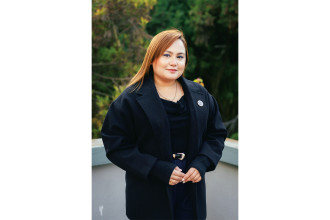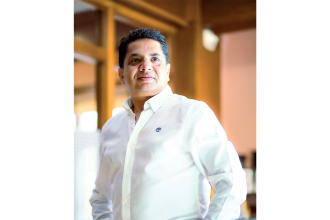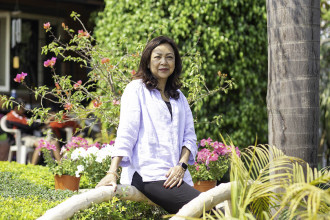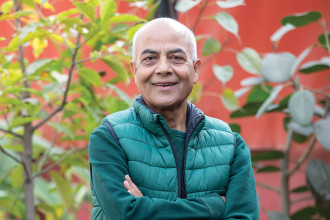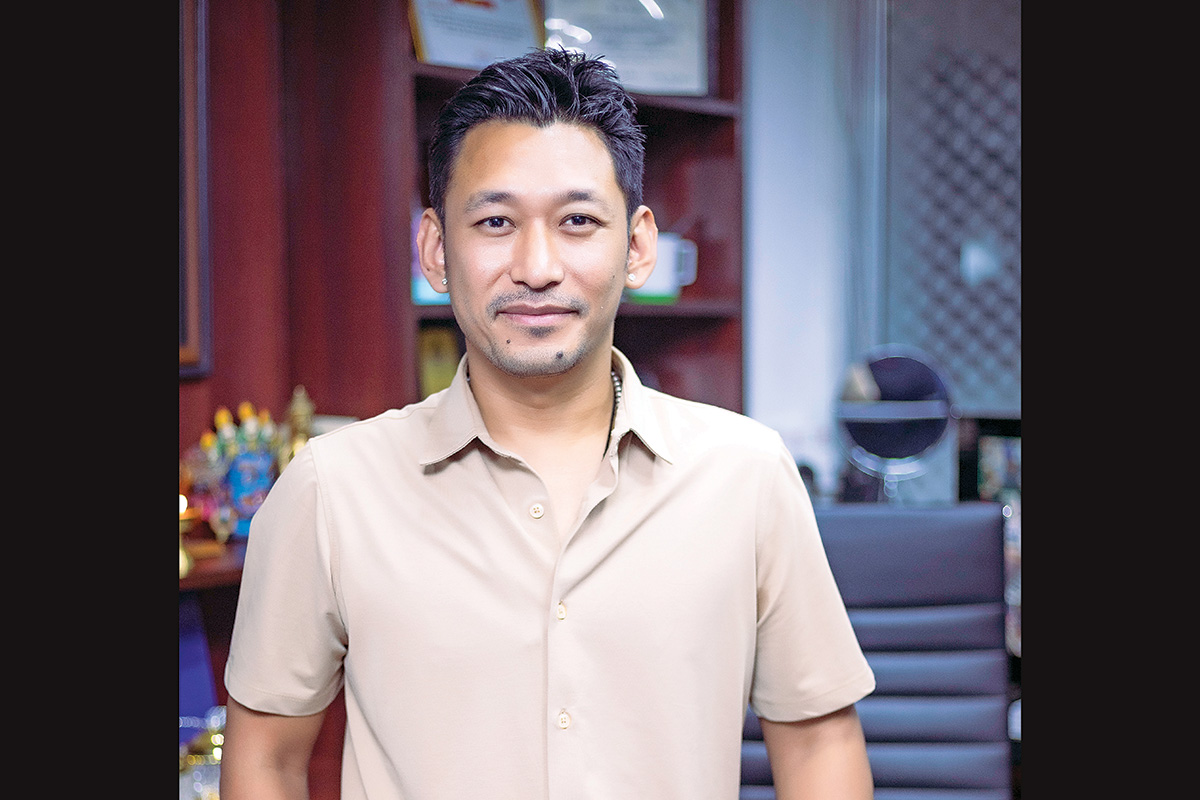
Riken Maharjan
Chairman, RB Diamond Jewellers
“Whether it is a diamond necklace, a café in the city, or a homestay in an old Newari house, I want everything I build to feel thoughtful, honest and grounded. There is still a long way to go but I know where I come from. And that gives me the clarity to choose where I want to go”
Riken Maharjan, Chairman of RB Diamond Jewellers, presents a compelling narrative of his life, deeply influenced by constant movement, necessary adjustments and a search for belonging. His early years were marked by frequent changes, from the disciplined atmosphere of Darjeeling to various schools in Kathmandu, each demanding quick adaptation. These experiences, though challenging, taught him that learning extends beyond textbooks, often stemming from observing and navigating new situations.
His journey continued with a significant shift to Bombay for further education, a city brimming with both opportunities and distractions.
Eventually, Maharjan spent eight years in the United States, earning both his Bachelor’s and Master’s degrees. This period was pivotal, not just for academic growth but for building essential life skills, fostering resilience and prompting deeper reflection on his identity and purpose.
Maharjan’s diverse background, including his discovery of gemology at the Gemological Institute of America and his insights into his father’s pioneering efforts in the Nepali diamond industry, has profoundly shaped his perspective. In this issue of Business 360, Maharjan speaks about the five things that have significantly impacted him and guided his path.
Movement, adjustment and a sense of belonging
My childhood was shaped by constant movement. I spent my early school years in Darjeeling. Although I was very young, I remember the calm atmosphere of the hills, the discipline of the school, and the way everything felt structured and predictable. Even though those years are a bit blurry now, they gave me my first experience of independence. I learned to live away from home and manage in a new environment.
After that, I returned to Nepal and continued my schooling in Kathmandu. I changed schools a few times before eventually completing my SLC from AVM School. Each school was different in terms of teaching style, student culture and expectations. This forced me to learn how to adjust quickly. It also taught me that learning does not always come from textbooks, it often comes from observing, adapting and dealing with new situations.
After high school, I went to Bombay for my +2. It was a big shift from the quieter life I had known until then. Bombay was fast, crowded and full of opportunities, but also full of noise and distractions. I did not have any long-term plans at that point. I was still figuring out what I wanted to do.
Eventually, I decided to go to the United States for further studies. I ended up staying there for eight years, completing both my Bachelor’s and Master’s degrees. Those years taught me more than just academics. Living on your own in a foreign country teaches you basic life skills – managing your time, handling your finances, solving everyday problems. It also teaches you resilience. You have no choice but to stand on your own two feet.
More importantly, being away from home gave me space to reflect. I began asking myself deeper questions about identity, purpose and the kind of life I wanted to build. I did not have all the answers but I started becoming more comfortable with the questions.
Discovering the jewellery trade
While studying in the US, I remained open to trying different things. That is when I came across the Gemological Institute of America (GIA). I enrolled in their programmes and became immersed in the world of gemology. GIA was a unique place. It was not just a school, it was a global learning hub for the study of diamonds, gemstones and jewellery. Students from all over the world came there, which made it a very international environment.
The more I learned, the more interested I became. I started seeing jewellery not just as a product but as something layered with meaning. Each piece involved design, science, craftsmanship and emotion. It was a mix of technical precision and human creativity.
Looking back, it is interesting how little I knew about my father’s work at that time. I knew he was in the jewellery business but I did not understand the risks he had taken or the space he had created. My father was not born into a business family. He started out as a farmer and then became a goods carrier in Hong Kong. That is where he first encountered the diamond trade. After returning to Nepal, he took the bold step of starting RB Enterprises in 1997.
What many people do not realise is that in those days, working with diamonds in Nepal was extremely difficult. Diamonds were classified under the same legal codes as drugs and other contraband. There was no legal way to import or trade them. But my father and mother believed in what they were doing. They took a major risk, one that even led to my father being detained for a few days. But they stood their ground.
Eventually, they succeeded in registering their company. RB Enterprises became one of the first legal importers of diamonds in Nepal. Even now, we face challenges. The law still treats diamonds in a confusing and outdated manner. As a result, it is hard to grow the industry in a structured way.
Still, the foundation my parents laid has allowed us to continue. They did not just build a business, they helped establish an industry.
Learning to work from the ground up
When I returned to Nepal in 2011, I had academic qualifications and international exposure but I lacked local experience. I thought I would be able to jump into the business right away. But it was not that simple. Things worked differently here. The systems were slower and finding the right kind of people to work with was a challenge. I felt frustrated at first. Everything took longer than expected.
In those early years, I had to be patient. I had to observe, ask questions and understand how things really worked on the ground. I had many conversations with my father. I told him that I needed space to figure things out for myself. He gave me that space and for that, I am grateful.
I began to understand the Nepali market. I realised that here, jewellery was not just about fashion or decoration. It was often a financial asset. When a customer walks into our showroom and spends Rs 100,000 on a gold necklace, they see it as both adornment and security. If needed, they know they can sell it and recover most of its value. So, in many ways, our jewellery store also functions like a financial institution.
That insight changed how I approached our business. We focused more on transparency. We invested in modern machines that test the purity of gold instantly. This made it easier to build trust with customers. We also started maintaining a database of all our customers, which has now grown to over 16,000 entries. That helped us provide better service and also understand changing customer needs.
Nepali customers have become more design-conscious over the years. They want jewellery that reflects their personal style, not just their family traditions. We have adapted to that. Today, we combine traditional skills with new technology, like 3D modelling, to produce more accurate and varied designs.
Exploring new paths
While jewellery remains my main field, I have never believed in sticking to one thing. Over time, I developed a strong interest in hospitality, community building and education.
One of my first experiments was a café called Time Out in Kumaripati. It was not just about food or coffee. It was about creating a space where people, especially young people, could hang out, talk, play games and relax. We included facilities like basketball and table tennis. For many, it became a second home – a safe, open space in the city.
Later, I helped start Panchaku, a homestay and restaurant project in Patan. The idea was to combine cultural preservation with tourism. We wanted to give foreign visitors a taste of real Newari hospitality. Everything, from the architecture to the food, was designed to reflect our heritage.
On another front, I got involved with Skill Lab, a platform that connects young people with career opportunities. Many fresh graduates in Nepal struggle to find the right path. The job market is competitive and the education system does not always prepare students for real-world challenges. Skill Lab tries to close that gap by offering assessments, training and job placement support. For me, this is one of the most meaningful things I do. It allows me to contribute beyond business and help shape the next generation of professionals.
Carrying a legacy forward
When my father passed away, it marked the end of an era in our family. But it also marked the beginning of a new chapter. I do not try to fill his shoes. That is not possible. But I do try to walk the path he made, while slowly extending it in new directions.
He taught me to value honesty. He showed me that real business is not about cutting corners. It is about earning trust. Especially during the Covid 19 pandemic, those values proved crucial. While many businesses collapsed, we managed to stay steady. Our customers continued to see jewellery as a secure form of saving. That long-term trust kept us going.
Today, people sometimes think I am also a jewellery designer. I do not consider myself one in the traditional sense. I do not sketch pieces all day or work on design software full-time. But I do take a lead role when it comes to brand direction, fashion shows and special projects. Our in-house team handles the day-to-day design work. We collaborate closely. The process involves not just creative ideas but also practical inputs from sales staff, customer feedback and technical experts.
As I look ahead, I want to grow, not just in terms of revenue or expansion, but in terms of impact. I want to build more platforms that offer value, create jobs, support local talent and keep our culture alive. Whether it is a diamond necklace, a café in the city, or a homestay in an old Newari house, I want everything I build to feel thoughtful, honest and grounded.
There is still a long way to go but I know where I come from. And that gives me the clarity to choose where I want to go.



